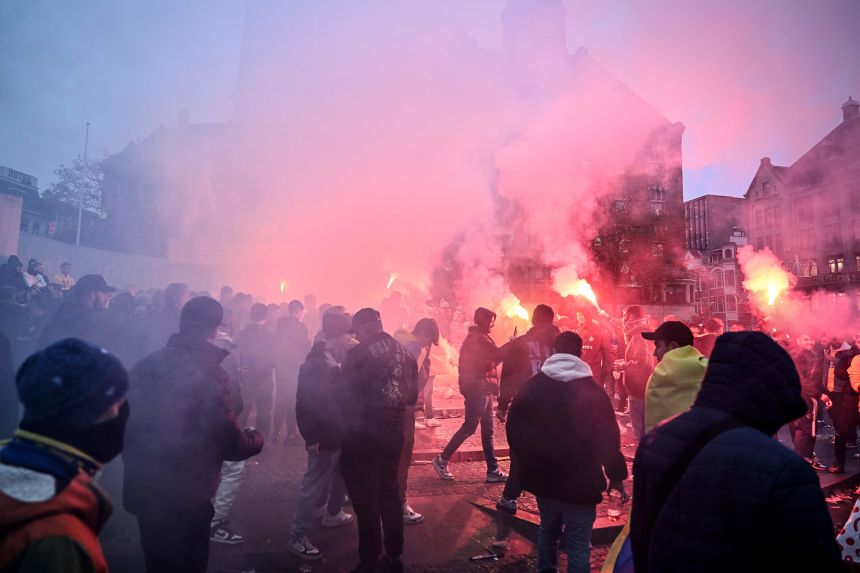The highly anticipated Tel Aviv soccer derby between rivals Maccabi and Hapoel was abruptly canceled on Sunday after authorities declared a state of “public disorder and violent riots.” Even before kickoff at the shared Bloomfield Stadium, scenes on social media showed fans aggressively clashing with police both inside and outside the venue. The chaos involved pyrotechnics and smoke grenades being hurled from the stands, leading Israel Police to conclude that “endangerment of human life” necessitated calling off the Israeli Premier League match. This latest outbreak of unrest left 12 civilians and three police officers injured, resulting in numerous arrests and detentions. The incident immediately cast a new, harsh light on a controversial decision made in England days earlier, where Maccabi fans were already banned from an upcoming Europa League game—a ban that now feels tragically validated by the scenes of domestic turmoil.
The Anatomy of the Riot: Chaos Before Kickoff
The decision to cancel the Tel Aviv derby was driven by the rapid escalation of violence, which transformed a passionate sporting event into a critical public safety incident before the ball could even be kicked.

The violence was immediate and widespread. Videos shared on social media captured fans engaging in clashes with police officers in and around Bloomfield Stadium. The situation inside the stands was equally volatile, with police footage showing pyrotechnics and smoke grenades being thrown onto the pitch and into the crowd. This level of disorder led Israel Police to make the extraordinary decision to call off the match, stating clearly that the primary reason was the “endangerment of human life.” By the time the unrest subsided, authorities confirmed that 12 civilians and three police officers were injured, with nine individuals arrested and a further sixteen detained for questioning, underscoring the severity and scale of the public disorder.
Hapoel’s Outcry: Criticizing the Police Response
While Maccabi remained officially silent on the incident, the rival club Hapoel Tel Aviv launched a blistering criticism of the Israel Police, accusing the authorities of overreacting and encroaching on the sport’s autonomy.
Hapoel released a statement that sharply condemned the police’s handling of the situation, arguing that the security presence was excessive and set a confrontational tone. The club claimed that it “already seemed that the police were preparing for a war, not for a sporting event.” This sentiment framed the police’s swift intervention and eventual cancellation of the game as a rash and unwarranted decision. Hapoel accused the Israel Police of having “taken control of the sport,” suggesting that their aggressive presence escalated the tension rather than containing it. This criticism created an immediate, secondary controversy, turning the focus from the fan violence itself to the professional conduct and judgment of the security forces tasked with managing high-risk soccer matches.
The UK Context: Validating Security Concerns Abroad
The violent scenes in Tel Aviv added immediate, powerful weight to the controversial decision made by local authorities in England days earlier to ban Maccabi fans from attending an upcoming Europa League match against Aston Villa.

The ban on traveling Maccabi fans was originally imposed by the West Midlands Police and local authorities in Birmingham due to the match being deemed “high risk” based on “current intelligence and previous incidents.” While the ban initially triggered condemnation from UK politicians, including Prime Minister Keir Starmer who called the decision “wrong,” the subsequent violent outbursts in Tel Aviv provided a painful justification for the English police’s precautionary stance. A Downing Street spokesperson, while asked about the incident, acknowledged that the UK government recognized the concerns raised by police due to “previous incidents in Europe” and added that they condemned the violent behavior seen in Tel Aviv. The spokesperson confirmed that the UK Football Policing Unit would be reaching out to their Israeli counterparts to understand the precise dynamics of the recent violence.
A Pattern of Disorder: The Broader Repercussions
The cancellation of the derby and the subsequent political fallout highlight a persistent problem with fan behavior, which is now having serious diplomatic and logistical repercussions across international soccer.
The violence in Tel Aviv is not an isolated event; it is part of a pattern of disorder that has frequently involved Maccabi supporters abroad. For instance, the security concerns cited by UK police stem, in part, from previous incidents in Europe. The need for diplomatic reassurances from the UK Prime Minister—who pledged to do “everything in his power to give Jewish communities the security they deserve”—underscores the complex safety issues now surrounding any international fixture involving the club. The public violence at a domestic derby now directly complicates the UK’s efforts to balance security mandates with political statements against anti-Semitism, forcing authorities to acknowledge and confront the reality of fan disorder that continues to transcend borders and impact the logistics of European competition.




